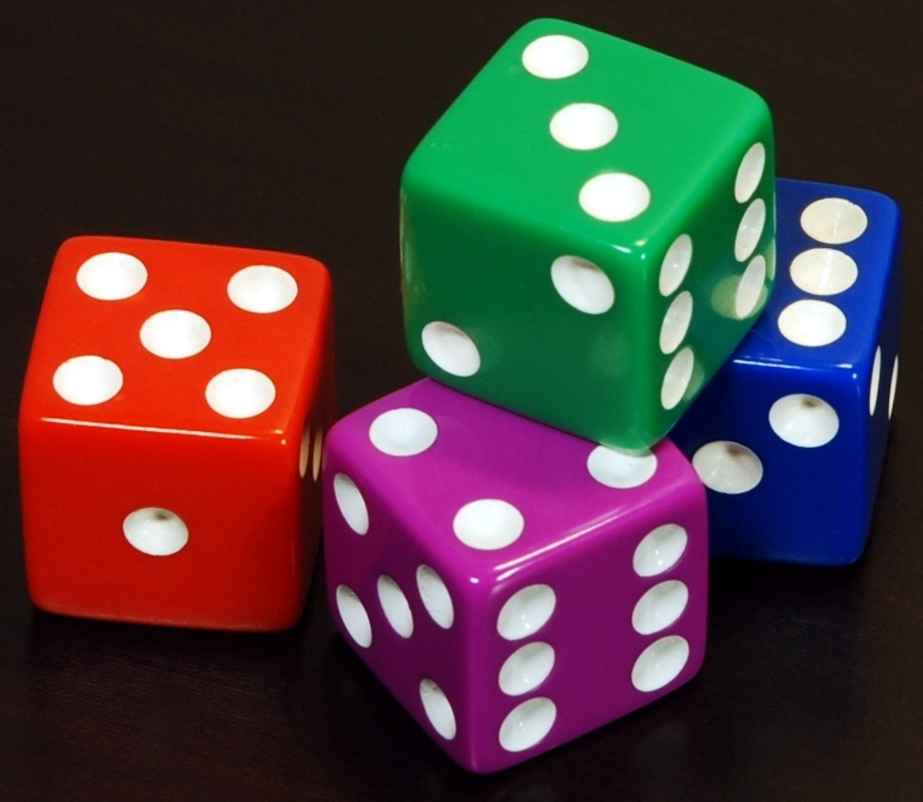Player 1 rolls a 6-sided die. Player 2 rolls a 6-sided die. If player 2 rolls the same as player 1, he rolls again. If he again rolls the same, he loses. How often will each player win?
 It seems obvious that player 1 will win since rolling a 6 guarantees
a win for him and getting the same thing twice guarantees a loss for player 2.
The atual math was interesting to reason through. We can simply go through each
possibility.
It seems obvious that player 1 will win since rolling a 6 guarantees
a win for him and getting the same thing twice guarantees a loss for player 2.
The atual math was interesting to reason through. We can simply go through each
possibility.
-
Player 1 rolls a 1
- Player 2 wins with anything else (5/6). If he rolls a 1 (1/6 chance), roll again with a 5/6 chance of winning
- Player 2 win chance is 5/6 + (1/6)*(5/6) = 35/36
-
Player 1 rolls a 2
- Player 2 wins with a 3 or up (4/6). If he rolls a 1 (1/6 chance), roll again with a 4/6 chance of winning
- Player 2 win chance is 4/6 + (1/6)*(4/6) = 28/36
-
Player 1 rolls a 3
- Player 2 wins with a 4 or up (3/6). If he rolls a 1 (1/6 chance), roll again with a 3/6 chance of winning
- Player 2 win chance is 3/6 + (1/6)*(3/6) = 21/36
-
Player 1 rolls a 4
- Player 2 wins with a 5 or up (2/6). If he rolls a 1 (1/6 chance), roll again with a 2/6 chance of winning
- Player 2 win chance is 2/6 + (1/6)*(2/6) = 14/36
-
Player 1 rolls a 5
- Player 2 wins with a 6 (1/6). If he rolls a 1 (1/6 chance), roll again with a 1/6 chance of winning
- Player 2 win chance is 1/6 + (1/6)*(1/6) = 7/36
- Player 1 rolls a 6; he wins automatically
Thus, Player 1 wins 100 - 48.6, or 51.4% of the time.
What if we change the rule slightly? Try this game:
Player 1 rolls a 6-sided die. Player 2 rolls a 6-sided die. If player 2 rolls the same as or less than player 1, he rolls again. If he again rolls the same, he loses. If he rolls higher in the second roll, he wins. How often will each player win?
Player 1 rolls a 6-sided die. Player 2 rolls a 6-sided die. If player 2 rolls the same as or less than player 1, he rolls again. If he again rolls the same, he loses. If he rolls higher in the second roll, he wins. How often will each player win?
I'll just do player 1 rolls a 2 as an example then present the answer since the logic is so similar.
If Player 1 rolls a 2, Player 2 will win with a 3 or above so 4/6. He will reroll for a 2 or below so 2/6 of the time, and his chance of winning that second roll is 4/6. Thus, if Player 1 rolls a 3, Player 2 wins 4/6 + (2/6)*(4/6), or 32/36.
Summing all paths up again, Player 1 wins this game 42.2% of the time.
To try to make things a bit fairer, consider one more game:
Player 1 rolls a 6-sided die. Player 2 rolls a 6-sided die. If player 2 rolls the same as or less than player 1, he rolls again and subtracts 1 from his roll. If he again scores the same, he loses. If he scores higher in the second role, he wins. How often will each player win?
Player 1 rolls a 6-sided die. Player 2 rolls a 6-sided die. If player 2 rolls the same as or less than player 1, he rolls again and subtracts 1 from his roll. If he again scores the same, he loses. If he scores higher in the second role, he wins. How often will each player win?
Going through the same logic, this is the fairest of these games. Player 1 wins 49.0% of the time.










0 comments:
Post a Comment